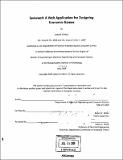Seaweed : a Web application for designing economic games
Author(s)
Chilton, Lydia B
DownloadFull printable version (31.65Mb)
Alternative title
Web application for designing economic games
Seaweed : a Web-based interface for designing simple economic games
Other Contributors
Massachusetts Institute of Technology. Dept. of Electrical Engineering and Computer Science.
Advisor
Robert C. Miller.
Terms of use
Metadata
Show full item recordAbstract
Seaweed is a web application for experimental economists with no programming background to design two-player symmetric games in a visual-oriented interface. Games are automatically published to the web where players can play against each other remotely and game play is logged so that the game's designer can analyze the data. Seaweed's interface draws heavily on interface features of Microsoft PowerPoint'" and ExcelTM, which experimental economists are familiar with. The design and implementation challenge in Seaweed is to provide an end user programming environment that creates games responsive to events and controlled by logic without the designer understanding programming concepts such as events and synchronization, or being burdened by specifying low-level programming detail. Seaweed achieves this by providing high-level visual representations for variables, control flow, and logic, and by automating behaviors for event handling, synchronization, and function evaluation. Seaweed contributes a end-user programming tool for economists, as well as generalizable designs for representing programming concepts visually. It also demonstrates that Amazon's Mechanical Turk is a viable platform for forming partnerships between people and paying them to perform cooperative tasks in real-time, cheaply and with high through put.
Description
Thesis (M. Eng.)--Massachusetts Institute of Technology, Dept. of Electrical Engineering and Computer Science, 2009. Includes bibliographical references (p. 60-61).
Date issued
2009Department
Massachusetts Institute of Technology. Department of Electrical Engineering and Computer SciencePublisher
Massachusetts Institute of Technology
Keywords
Electrical Engineering and Computer Science.